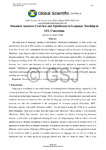Please use this identifier to cite or link to this item:
http://thuvienso.bvu.edu.vn/handle/TVDHBRVT/20519Full metadata record
| DC Field | Value | Language |
|---|---|---|
| dc.contributor.author | Huynh, Thi Anh Tram | - |
| dc.date.accessioned | 2022-07-07T08:49:14Z | - |
| dc.date.available | 2022-07-07T08:49:14Z | - |
| dc.date.issued | 2022 | - |
| dc.identifier.issn | 2320-9186 | - |
| dc.identifier.uri | http://thuvienso.bvu.edu.vn/handle/TVDHBRVT/20519 | - |
| dc.description.abstract | The main goal of language teaching is the learners’ interaction competence, in both written and spoken form. Not all of EFL learners, nevertheless, are able to successfully communicate in English since they do not fully comprehend the knowledge of language and are not good at language use. Therefore, many linguists and researchers have investigated the teaching language on the ground of discourse analysis. This paper aims at studying the notion of discourse analysis (DA), its significance in language teaching in the EFL classrooms. It will shed light on discourse analysis and the relation between text, context and discourse as well as how discourse analysis is important in teaching English. Furthermore, the researcher discusses applications of DA in language teaching in EFL classrooms and suggests some effective ways of teaching to improve the quality of English language teaching and learning | vi |
| dc.language.iso | en | vi |
| dc.publisher | Global Scientific Journals | vi |
| dc.relation.ispartofseries | GSJ: Volume 10, Issue 6, June 2022;pp. 1730-1737 | - |
| dc.subject | Discourse analysis | vi |
| dc.title | Discourse Analysis: Overview and Significance in Language Teaching in EFL Classrooms | vi |
| dc.type | Article | vi |
| Appears in Collections: | Ngoại ngữ - Khoa học xã hội (Articles) | |
Files in This Item:
| File | Description | Size | Format | |
|---|---|---|---|---|
| Huynh-Thi-Anh-Tram.pdf | 811,39 kB | Adobe PDF |  Sign in to read |
Items in DSpace are protected by copyright, with all rights reserved, unless otherwise indicated.